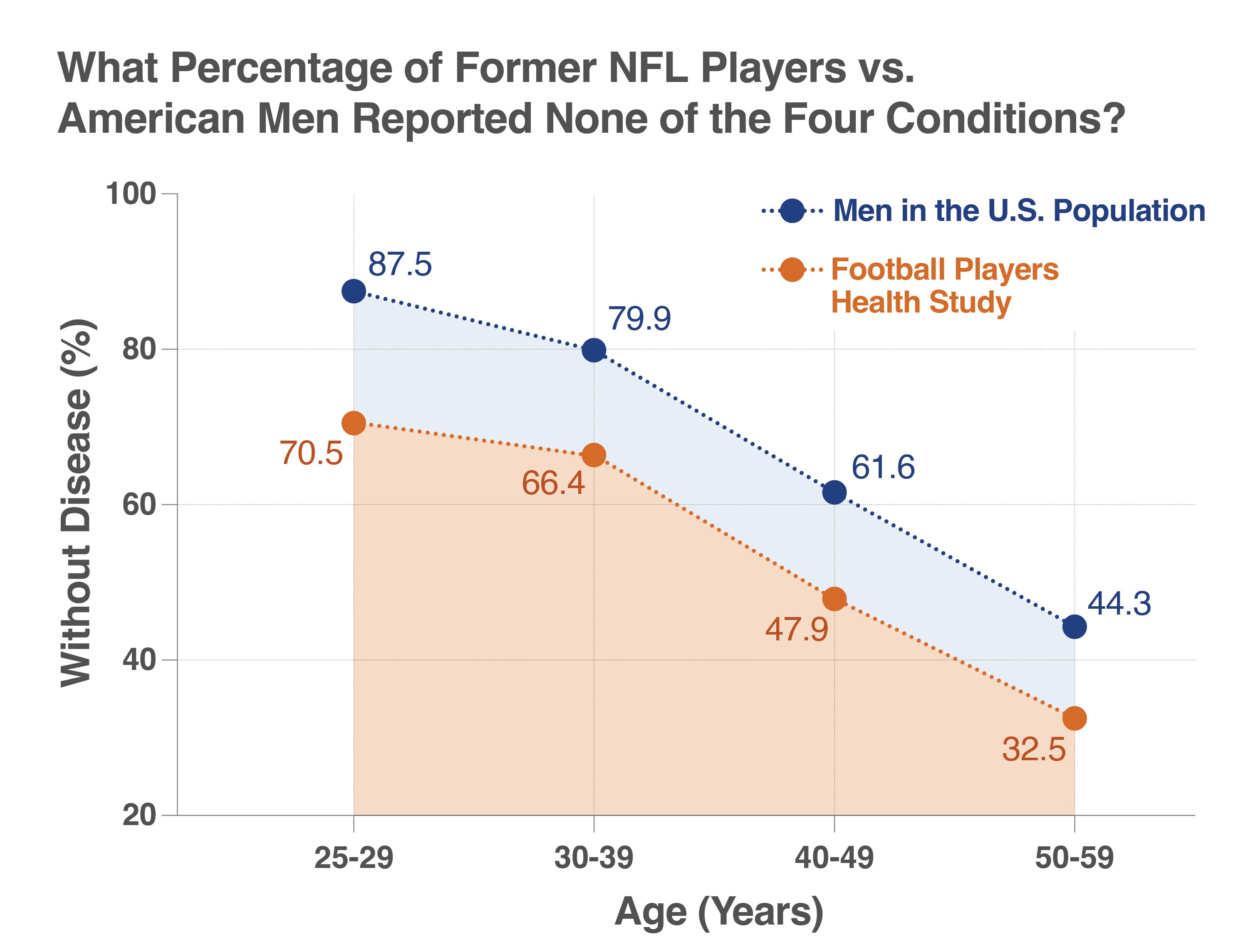Premature Aging in Former Football Players: Age-Related Health Conditions May Impact Former Players Earlier
Have you ever felt older than your actual age? Former players define their age not only by the number of years they have been alive but also by the way their bodies feel.
Previous research has shown that former professional football players live as long or longer than men in the general population. However, former players have reported that they feel older than their actual age. At the same time, doctors who treat former players have noticed players are being diagnosed with “advanced age” conditions earlier than expected. These observations motivated us to ask:
Despite their long lifespans, are football players experiencing early aging and living with illness and disability for more years than non-football players?
To address this question, our researchers and health practitioners examined the occurrence of four chronic diseases in 2,864 former players under the age of 60, including arthritis, dementia/Alzheimer’s Disease, hypertension, and diabetes.
Additionally, we used a concept called healthspan, which categorized players into unafflicted (free from any of the four conditions) or afflicted (self-reported at least one of the conditions studied).
Significance of this Study
- Prior to this study, relationships between age, healthspan, and chronic illness had not been rigorously examined among former NFL players.
- This study is important for future research, practice, and policy. We highlight the need to identify young and middle-aged players who may harbor cardiometabolic, orthopedic, and neurocognitive disease.
- Interventions (pharmacological, procedural, and behavioral) could lead to positive changes in both mortality and morbidity in former professional athletes.
What the Science Says
- As expected, our research confirmed that hypertension, diabetes, arthritis, and dementia all increased with age in both football and general populations.
- However, the proportion of players who experienced these conditions was different from non-players. For both arthritis and Alzheimer’s disease/dementia, we found an increase in self-reported diagnoses across all ages.
- For hypertension and diabetes, a higher proportion of former players reported these conditions only in the youngest age group (25–29).
- Our findings showed that players, on average, had 10 fewer years of healthspan, meaning they were without hypertension, arthritis, Alzheimer’s/dementia, and/or diabetes (as shown in the graphic below). This means that former players reported “loss of health” (reporting at least one of the four conditions of interest) appropriately ten years earlier than non-football American men.
- Among football players, linemen were more likely to report at least one of the conditions studied compared to non-linemen under the age of 50.
Action Items for Former Players
- Talk to your doctor about a check-up for these chronic conditions. Early action is key to improve your quality of life and long-term cognitive, heart, metabolic, and musculoskeletal health, addressing signs and symptoms of hypertension, arthritis, Alzheimer’s/dementia and/or diabetes. If you need help finding a doctor:
- Contact your insurance company for a list of primary care physicians within your network.
- Reach out to friends and family members for referrals to their primary care physicians.
- Large hospitals in your area will list available physicians on their website. Try reaching out to your local hospital for their available primary care physicians.
- When discussing hypertension, arthritis, Alzheimer’s/dementia and/or diabetes, it’s helpful to keep in mind the following findings:
- Early life exposure to hypertension can have long-lasting implications for cardiovascular and cognitive health. Even if you are relatively young, it is important to be proactive about maintaining a healthy blood pressure through managing your lifestyle, as well as introducing dietary and health recommendations as guided by your health providers.
- Talk to your doctor about your blood sugar. If you are diabetic or pre-diabetic, medical interventions and/or lifestyle changes could be an option.
- If you think you may be experiencing symptoms of cognitive impairment, you can request more information about having a comprehensive neurocognitive evaluation from your primary care physician (PCP) which can be done by a neurologist or another highly trained specialist.
- Learn more about ways to stay healthy and extend your lifespan and healthspan. For example, maintaining a social network, healthy diet, and exercise routine have all been proven to be supportive and helpful.

